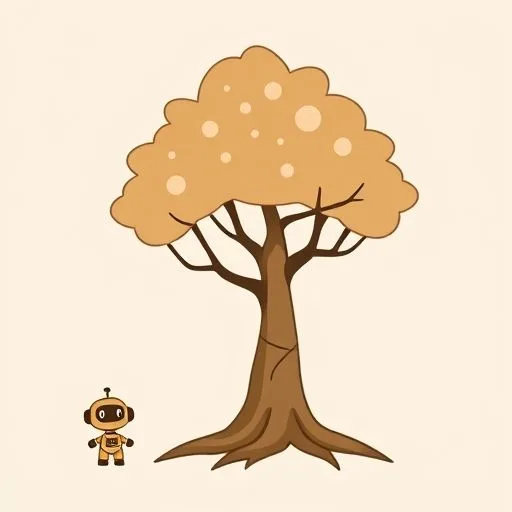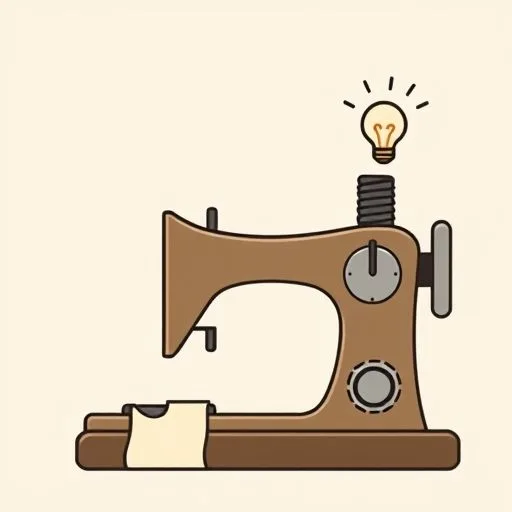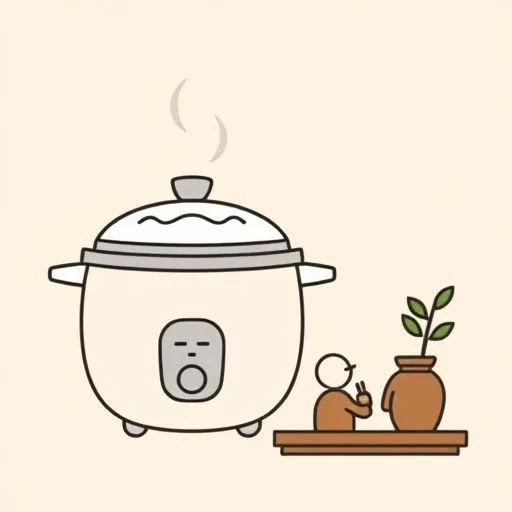
On our walk home, my daughter asked if robots will take all jobs. Her innocent question led me to 200 years of work revolutions. Just as past generations adapted, our kids will thrive amidst AI’s changes.
Can Machines Replicate Human Creativity? Lessons From a Sewing Machine

Let me paint you a scene from my childhood—the golden hour light streaming through our Vancouver kitchen window, my Korean grandmother’s worn sewing machine whirring like a frantic cicada, and my Canadian grandfather humming Frank Sinatra while adjusting the tension dial.
‘See this, son?’ he’d say, guiding fabric beneath the needle. ‘This machine stitches faster than 100 tailors from my apprenticeship days. But watch…’ With dramatic flair, he’d yank the thread, producing a tangled mess. ‘It still needs this.’ He’d tap his temple. ‘And this.’ He’d squeeze my hand.
Today’s AI panic feels like history’s greatest remix. That 19th-century sewing machine initially displaced artisans, yes—but birthed entire new industries in fashion design, mechanical engineering, and global trade. MIT researchers confirm a pattern: while automation closes some doors, human creativity kicks open trapdoors we never imagined.
As I watch my daughter ‘debug’ her robot-dog’s misbehaving paw with LEGO solutions and Band-Aids, I recognize what the printing press monks missed—machines excel at tasks, but childhood curiosity solves tomorrow’s mysteries.
When Playgrounds Become CEO Training Grounds

Thursday afternoons at our neighborhood park unfold like a CEO summit with juice boxes. Last week, amid negotiations over swing turns and stick-sword alliances, I overheard a negotiation masterpiece: ‘Okay, you can be queen of the slide IF you let me test my new robot voice on your teddy bear!’ These tiny humans are already mastering what economists call ‘augmentation’—blending technology with emotional intelligence in ways no algorithm can replicate.
The childhood race against machine takeover echoes through centuries—from 1820s Luddites smashing looms to today’s TikTok debates. Yet history’s most profound lesson emerged during their recent playground standoff when my daughter yelled ‘No cheating!’ at a friend using smartwatch help in hide-and-seek. Their jury of third graders reached a verdict: Tech’s allowed, but only if it makes the game more fun for everyone. And just like that, ‘AI-assisted tag’ came to life—watches track steps, but you forfeit if caught being unkind. Watching them negotiate this tiny constitutional convention, I saw democracy’s future guardians.
The data sings: Studies show that while robots currently impact manufacturing jobs most, they’re creating higher-paying roles in robot maintenance and AI ethics. I remember last month’s family disaster—er, adventure—when our smart fridge decided Kimchi jjigae was ‘expired’ and locked itself. My daughter’s solution? Drawing it a ‘smiley friend’ to feel less lonely.
Precisely the kind of whimsical problem-solving people everywhere will be lining up for those skills.
Our job? Not to panic over screens replacing sandboxes, but to nurture kids who treat technology like another crayon in their creativity box. Research shows that kids raised blending unstructured play with tech exposure develop the adaptability that AI can’t replicate. Next rainy Saturday, try the ‘AI & Play-Doh’ challenge we invented: Mold something impossible, then ask ChatGPT how to (theoretically) build it. Watch their eyes ignite realizing human imagination fuels the machine. It’s why we swap ‘robot takeover’ drills for ‘robot collaboration’ adventures—like reprogramming her dancing toy to welcome newcomers at the community center.
What Does a Rice Cooker Teach About Balancing Technology?

Sunday mornings in our kitchen smell of garlic, sesame oil, and generational wisdom. As my daughter perches on her stool, enthusiastically demolishing cucumber slices meant for bibimbap, I marvel at how our rice cooker embodies humanity’s dance with technology. My halmeoni rinsed rice in icy streams before dawn; we press a button. Yet here we are—still gathering, chopping, laughing, teaching.
A recent MIT study shows a simple truth: Technologies succeed when they free us to enhance our humanity, not replace it. The rice cooker didn’t kill family meals; it gifted us time for storytelling while monitoring that perfect simmer. Similarly, AI’s threat isn’t job elimination—it’s choosing efficiency over connection.
That’s why we’ve banned phones during our ‘mandu-making marathons’ despite my techie instincts. Robots may someday fold dumplings, but they’ll never recreate Auntie Min’s exaggerated gasp at my daughter’s lopsided creations.
Here’s my ‘appatech’ parenting hack: When introducing new tech, ask two questions: 1) Does this deepen or distract from real-world experiences? 2) What will we do with the time it saves? Last full moon, instead of letting Alexa calculate lunar phases, we raced through night streets making shadow puppets under its glow. Tomorrow’s jobs belong to kids who know when to log off and leap into puddles.
Why Do Emotional Safety Nets Outrank Algorithms for Future Jobs?

Parenting in this age of acceleration often feels like building wings mid-flight. Last Tuesday brought that home hard: My usually fearless girl wept over schoolyard taunts about ‘stupid human kids’ being obsolete. We sat on the edge of her glow-in-the-dark star bed, frayed Mr. Bunny clutched between us, as I whispered something revolutionary: ‘Every time the world feels too fast, look for the helpers—just like Mr. Rogers said.’
Labor statistics reveal a stunning truth: Despite AI sparking displacement fears, demand skyrockets for counselors, teachers, and healthcare workers—roles requiring emotional intelligence no bot can mimic. Like when last winter’s flu hit, and she requested her ‘Canadian appa voice’ for comfort stories rather than the slick AI narrator on her tablet. Machines calculate; humans heal.
Our challenge? To raise kids fluent in Python and empathy, who debug robot errors and playground conflicts with equal care. Start simple: Make “empathy upgrades” part of tech conversations. After she masters a coding game, ask, ‘How do you think that character felt when you solved the puzzle?’ Show them AI art, then grab watercolors to capture what the pixels missed—like how halmeoni’s hands tremble when pouring tea.
Two centuries teach us: Work evolves, but sandbox diplomacy remains humanity’s superpower. So let them climb trees, scrap knees, and teach chatbots knock-knock jokes. Tomorrow belongs to balanced humans who know when to code, when to care, and when to chase fireflies barefoot.
Source: AI Isn’t The First Job Killer: What 200 Years Of Work Teaches Us About The Future, Forbes, 2025-09-22
